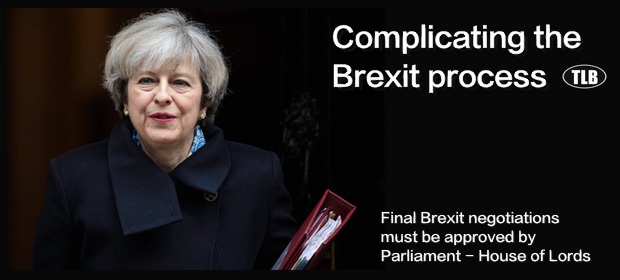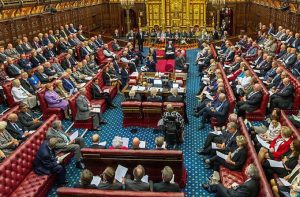
Lords disrupt May’s Brexit strategy
ERIC MAURICE
The House of Lords adopted an amendment on Tuesday (7 March) that requires a British parliament vote at the end of the future Brexit negotiation between Britain and the EU in a move that casts new doubt on the upcoming process.
The amendment passed by 366 votes to 268 as an additional clause in the bill authorising the government to trigger Article 50 of the EU treaty and start exit negotiations.
It says that the British parliament must approve any exit deal before it is debated by the European Parliament.

It also says that British MPs would have to approve a British decision to abandon the EU talks without a deal.
The vote marked the Lords latest intervention in the Brexit process.
Last week, the British peers also voted to demand a guarantee for the rights of EU citizens living in the UK.
The upper house amendments could still be rejected by the House of Commons in the final version of the European Union (Notification of Withdrawal) Bill.
But if they go through, they would mark a setback for British prime minister Theresa May.
They would also tie her hands in the talks by making her bluff on quitting the EU without a deal less credible.
Last month, May said MPs would be “consulted” after the Brexit negotiations but would not have a final say.
She had also promised to trigger Article 50 by the end of March, but the parliamentary process could delay the move.
The ruling Conservative Party’s Brexit minister David Davis said after the vote on Tuesday: “We will now aim to overturn these amendments in the House of Commons”.
“It is clear that some in the Lords would seek to frustrate that process, and it is the government’s intention to ensure that does not happen. We will now aim to overturn these amendments in the House of Commons,” he added.
But several Tory MPs support the Lords amendment.
“It is critical parliament has an option to decide on the way forward if there is no deal,” Tory MP Neil Carmichael told the Guardian newspaper.
Another MP, Anna Soubry, said there was a “real risk that in the event of no deal we will have a hard Brexit, which my constituents did not vote for”.
EU leaders originally expected May to formally notify them on Article 50 at this week’s summit in Brussels.
Some have said it could be done in mid-March, but a more likely moment would be at the very end of the month, after the EU’s Rome summit on 25 March.
The Brexit process should be concluded by October 2018, according to the EU’s chief negotiator, French politician Michel Barnier.
That timeframe would make it difficult to solve the growing number of issues raised by Brexit.
These include the UK’s estimated €60-billion bill, the status of Northern Ireland and Scotland, as well as the future of EU-UK trade and financial relations and the daily life of Britons living or traveling in the EU.
Prepare for ‘unlikely scenario’
The possibility that no clear deal is reached in time has been raised in both London and in Brussels.
Last month, Davis told his colleagues in the cabinet to prepare “not just for a negotiated settlement but the unlikely scenario where no mutually satisfactory agreement can be reached”.
He said Britain was facing “its most important peacetime operation” and highlights “the scale and the complexity of the work ahead”.
In a speech to the Belgian parliament last month, European Commission head Jean-Claude Juncker said it would take two years to reach an agreement “on the exit arrangements” and that it “will need years to agree on the future architecture of the relations between the UK and EU”.
Some even think that Brexit might not ever happen, if Britons see how difficult it is to leave the bloc and what the real consequences are.
“I would not be surprised if they have another referendum at the end and vote to stay,” a senior EU politician recently told EUobserver.
“When you listen to British ministers they seem to want that,” he said.
************
ER recommends other articles by EUobserver




